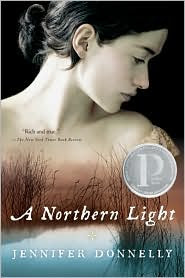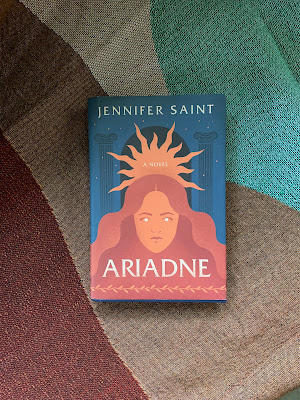A Northern Light
 |
| Photo from Barnes & Noble |
I was set to giving this book a three-star rating when I happened to read on the Author's Note part that the characters of Grace Brown and Chester Gillette, as well as the facts of Grace's murder in the Adirondacks and the fishing out of her body from the waters of the Big Moose Lake, are actually real people and events. Thus, although the book's main protagonist, Mattie Gokey, was fictional, the novel was actually constructed upon and based on history.
And I have a certain penchant for historical fiction.
Mattie is a sixteen-year-old bookish girl who works at the Glenmore Hotel to help make ends meet for her family; since her mother's death and her elder brother Lawton's departure years before, she was tasked, as the next oldest child, to take care of her three younger sisters, and to help their Pa with farm and house chores. Despite their poverty, however, Mattie does excellently in school; her teacher, Miss Wilcox, sees her potential, and helps her in every way she can in order for Mattie to win a scholarship to a New York University and continue her college education.
At the Glenmore, Mattie earns her wages by doing odd jobs in the kitchen and serving food to the hotel guests. It was there that her path crosses with Grace Brown's: the latter, on the day before her body was fished out from the murky waters of the nearby lake, entrusts a bunch of letters in Mattie's care, leaving behind specific instructions to burn them. Grace then goes boating with her beau, Carl Grahm, and never returns. With this unexpected turn of events, Mattie is at a loss as to what should be done to Grace's letters.
The novel shifted between time frames: from the time Mattie was at home with her family, pitching in with the farm chores and various errands around their house, to the time when she had started work at the Glenmore as a waitress/kitchen hand. It took some getting used to at first, and yes, I was also confused at first, but eventually the story unfolded, and beautifully. I liked how the author wrote the novel; simple, straightforward, and as vivid as she can make it, such that it wasn't so hard to imagine that you were right there, among the characters themselves.
However, the novel felt like a collection of stories that weren't inter-connected with each other. The story of Miss Wilcox, Mattie's teacher, her personal battles and her secret identity, had no connection with the mystery of Grace Brown's death, which is, of course, another story by itself. At first, I thought that Miss Wilcox would also figure, somehow, in the investigation of Grace Brown's murder, but the story took on a different angle somewhere. So there were parts in the novel when I felt like I didn't know where the storyline was going.
That aside, I enjoyed the book for its historical value (although the realization of that came much later), and more. I loved how Mattie challenged herself to learn new words everyday by consulting a dictionary, picking a word, and attempting to use it for that day. I also loved how she and Weaver would have word duels, throwing back similar words to the other until the other runs out. Back when I was a student, my friends and I used to play the same game, although it wasn't synonyms we'd be "dueling" on; it was just random stuff like one-title songs, one-name artists, etc. I also loved the ending; why, however, I will not elaborate lest I spoil the book for anyone.
Having said all those, I know that the book deserves more than just 3 stars from me. Although it took me a while to finish this (as I read this simultaneously with A Passage To India, a very difficult read), I realize now that the slow but steady reading pace that I kept made me appreciate the beauty of this book all the better. It would be a shame to breeze through this book and fail to see its true value.
My Rating: 4 out of 5 stars


Comments